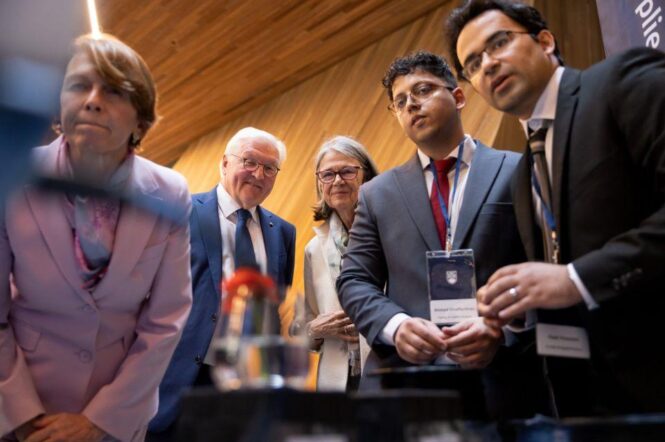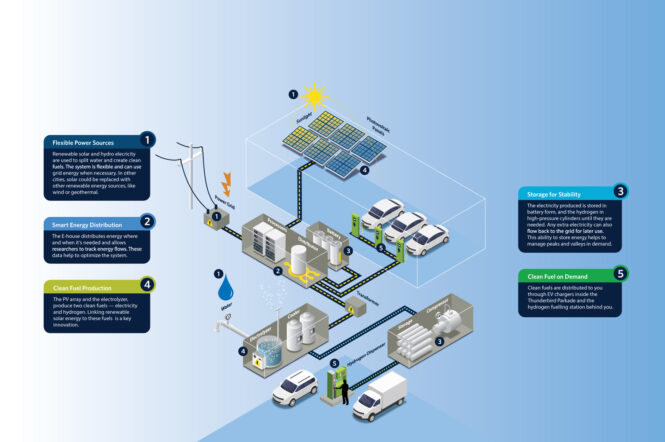Initiatives
Mobilizing research to accelerate solutions for today and the future.
Featured

German President’s visit to UBC highlights clean energy and climate change solutions
The University of British Columbia today hosted Frank-Walter Steinmeier, the President of Germany, as part of his first official visit to Canada.
$83.6M to Accelerate Community Energy Transformation
The University of Victoria will lead a national, multi-partner research initiative that will help get Canada to net zero—one community at a time—with thanks to an $83.6-million investment from the Canada First Research Excellence Fund (CFREF). Accelerating Community Energy Transformation (ACET) is a collaborative initiative that brings together over 40 partners, including Indigenous knowledge keepers and community leaders,…
Latest
-

UBCO engineers dive into local flood recovery, prevention
While infrastructure clean-up and repairs continue across the province after the extreme weather events of 2021, UBC Okanagan researchers have created measures to help municipalities mitigate damage from future climate-related disasters. -

UBC engineers want to save whales from drowning… in noise
Chronic ship noise can lead to stress, hearing loss and feeding problems for marine mammals like whales, dolphins and porpoises. UBC Engineering researchers are diving in to help address the issue. -

Powerful new antibacterial coating to be developed by UBC engineering researchers
Teck is working with partners across Canada and beyond to increase the use of copper-infused surfaces in health care and public spaces to reduce the spread of infections. -

Unlocking material solutions from nature
Researchers at BPI are developing everything from fine fibres for textiles and packing materials made with manipulated wood to more complex materials such as lightweight plastic alternatives, wooden bioproducts that act like glass, energy harvesting and storage devices – all from natural biological sources. -

Canada Research Chair awarded to UBC Nursing associate professor
Dr. Jenkins’s CRC research program aims to develop effective strategies to promote mental health to and minimize substance use harms in youth under 24 years of age, a research priority locally, nationally and globally. -

UBC Okanagan Engineering leads research to explore new net zero home
A unique, made-in-Kelowna collaboration to create an energy-efficient, high-performance home is taking the goal to the next level. And that goal is zero. -

UBC research could help astronauts eat well on future Mars missions
Omega-3 is essential to mental sharpness. Even a couple of days without omega-3 in our diets may dull our brains and have us feeling less than our best. However, our bodies cannot produce it naturally so we must find it in the foods we eat, such as fish, flaxseed, or often by taking supplements. -

UBCO Engineering research says a change in work habits is costing employees money
Researchers at UBC Okanagan have undertaken an extensive analysis of daily in-home activity to compare pre-pandemic and pandemic behaviour. They determined working from home is costing employees money. -

Why new research in concrete could save BC homes
When a deadly 6.3-magnitude earthquake hit Christchurch, New Zealand, in 2011, over 60 per cent of concrete buildings three storeys or higher in the downtown business district had to be demolished as they were no longer safe to live or work in. Structural engineer Dr. Lisa Tobber, an assistant professor in the School of Engineering within UBC’s… -

Roots are taking shape for UBC Okanagan’s Indigenous Micro-Forest
A version of this article originally appeared on UBC Okanagan School of Engineering. New funding from the Indigenous Strategic Initiatives Fund will enable relationship building with the Syilx Okanagan People to establish an Indigenous-inspired natural space for teaching and learning. The Indigenous Micro-Forest project will endeavour to establish a self-sustainable, green, biodiverse ecosystem on UBC Okanagan campus, guided… -

UBC Applied Science projects receive $3M in research infrastructure investment
Nineteen UBC Applied Science research projects to improve people’s health and safety have been awarded over $2.9 million in research infrastructure support through the BC Knowledge Development Fund (BCKDF). -

New tools from UBC Nursing aim to improve care for people experiencing substance use stigma
Researchers at UBC Faculty of Applied Science and Western University are offering a suite of tools and strategies to ensure that people who experience substance use stigma can receive better care in the future.













